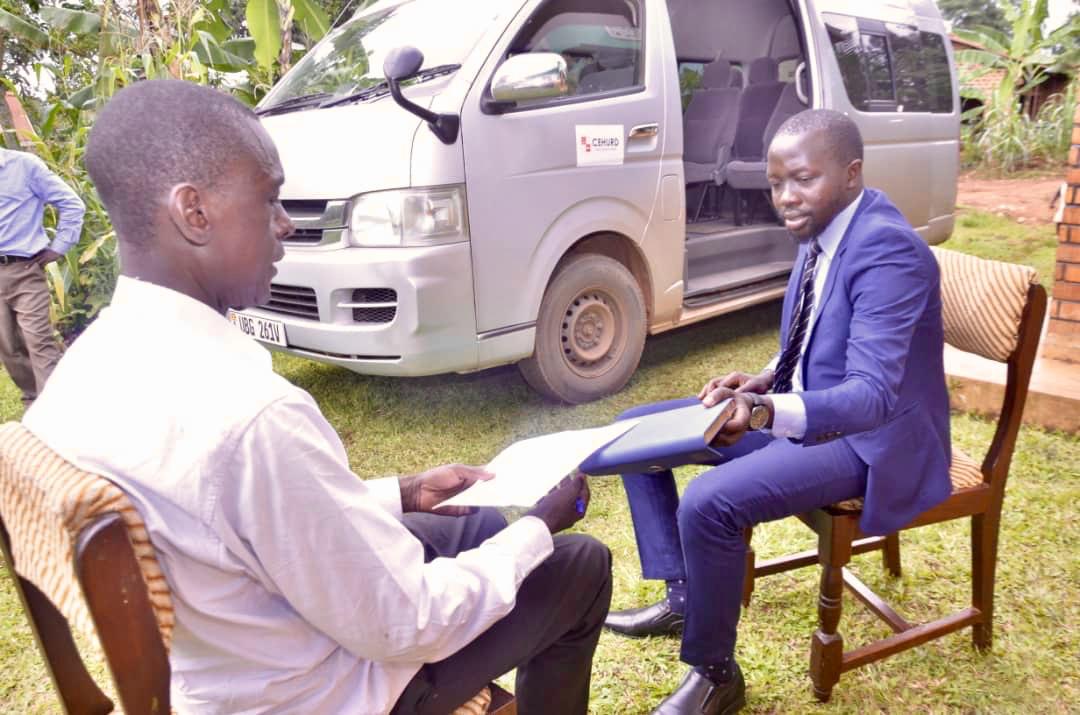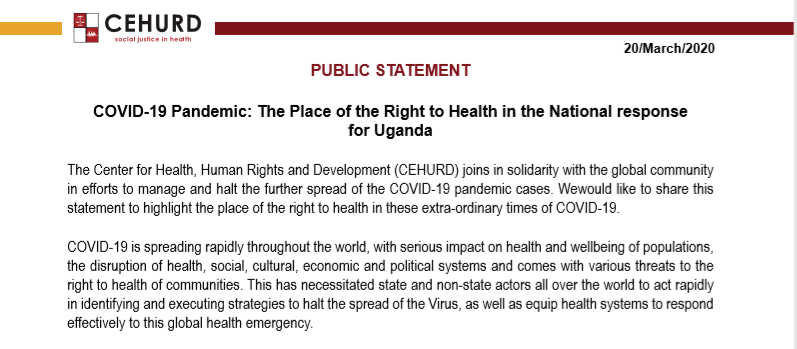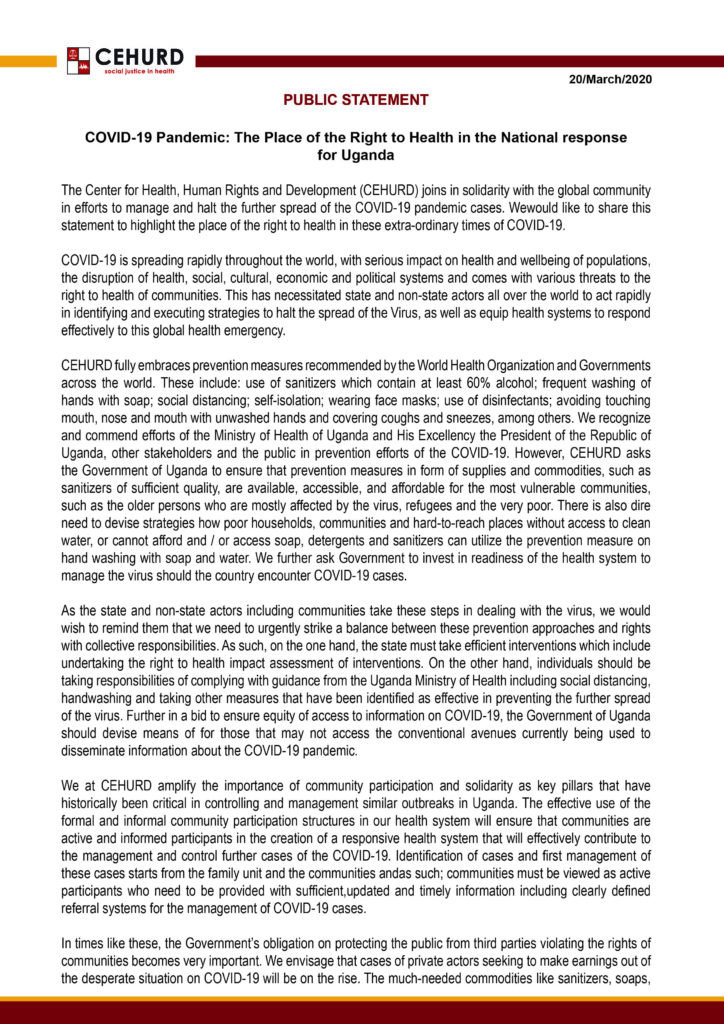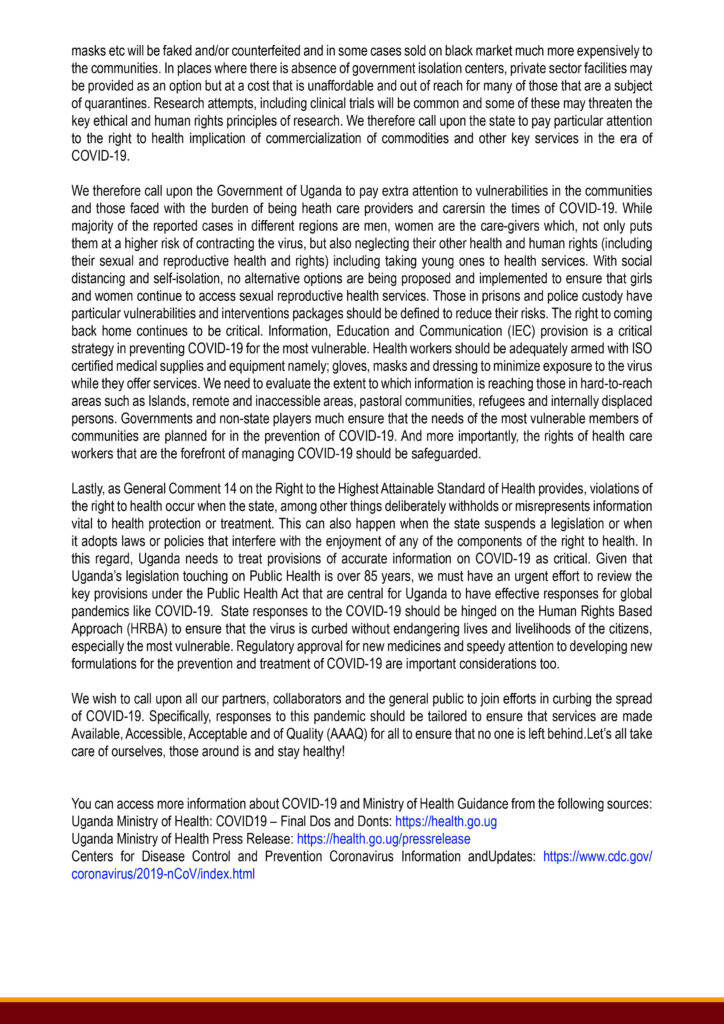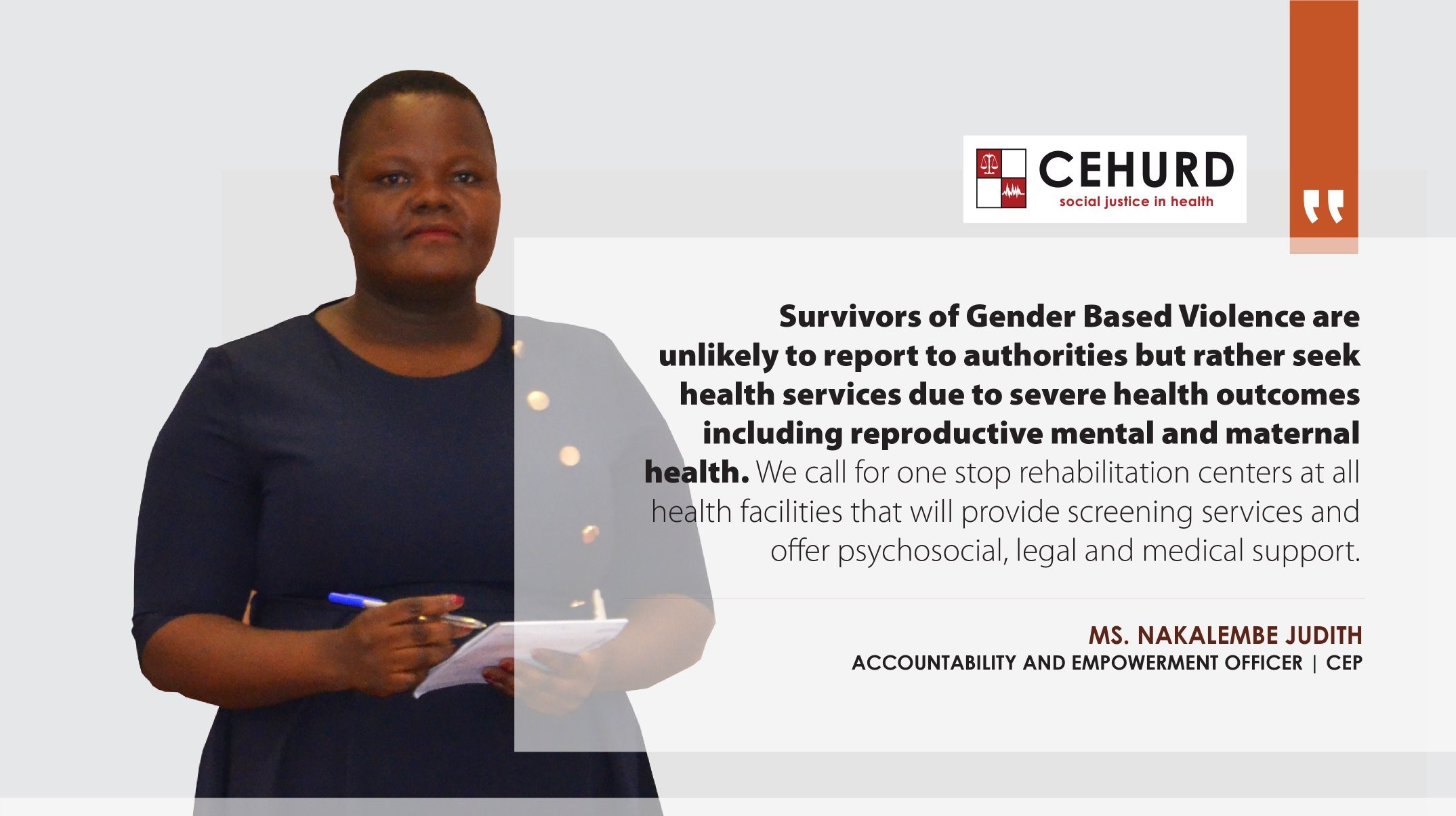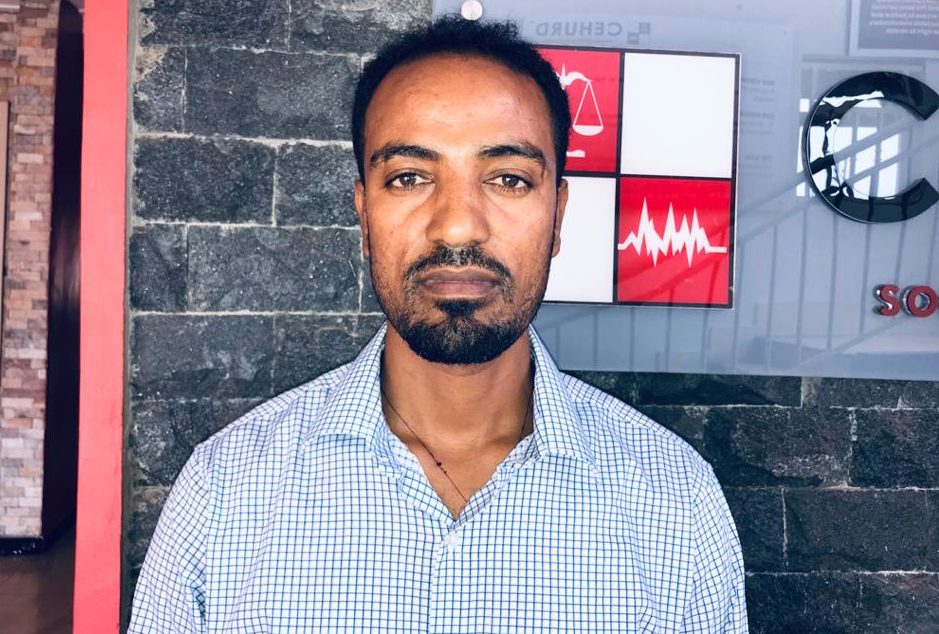Improving Maternal Health and
Promoting Safe Motherhood with Three-Pronged Approaches: Education, Human
Rights and Access to Reproductive Health Services in Uganda
Sefinew Demlie Gezahegn
(BSW, MA, MS)
Open Society Institute’s Civil
Society Professionals Program Fellow (2019/20) at CEHURD
The
purpose of this paper is to understand the extent of maternal health problems
in Uganda. The paper will explain the major causes of maternal death,
complications of maternal health, access to reproductive health services, and
interventions to improve maternal health and promote safe motherhood.
Maternal
health is the overall health of a mother during gestation, pregnancy,
childbirth, and for a period afterwards. Maternal death is “the death of a
woman while pregnant, or within 42 days of termination of pregnancy,
irrespective of the duration and site of the pregnancy or its management (from
direct or indirect obstetric death), but not from accidental or incidental
causes” (Roback Morse, 2014, par. 6).
According to the World Health
Organization (WHO) (2019), approximately 830 women die daily from preventable
causes associated with pregnancy and childbirth. In 2017, the Maternal Mortality
Ratio (MMR) in developing countries like Uganda was found to be 462 per 100,000
live births whereas the MMR for high income countries was 11 per 100,000
livebirths (WHO, 2019), a stark 451 difference.
In
the East African region, major barriers such as inaccessible Sexual and Reproductive
Health (SRH) care services contribute to maternal deaths. To prevent maternal
mortality and morbidity, access to comprehensive abortion care and contraceptive
services are largely needed. In this East African region, it is estimated that
2.7 million abortions take place annually; however, a majority of these
abortions are unsafe and oftentimes a cause for maternal mortality and
morbidity (Cleeve
et al., 2016).
In 2016, the
Ugandan Demographic Health Survey (UDHS) indicated that Uganda has shown slight
progress in reducing maternal mortality which was 368 deaths per 100,000 live
births compared to 428 maternal deaths per 100,000 live births in 2011(UDHS, 2011;
UNICEF Uganda, 2019). In 2016, approximately 15 pregnant Ugandan women were
dying every day because of direct causes such as hemorrhage and hypertensive
disorder.
Complications
(such as high blood pressure, gestational diabetes, anemia, infections, breech
position) during pregnancy and following childbirth remain a common cause of
maternal mortality. Almost all of these complications develop during pregnancy (Atuhaire & Kaberuka, 2016).
In Uganda, hemorrhage (42%), prolonged labor (22%) and unsafe abortion (11%) are
the major causes for maternal mortality (Böhret,
2018).
Notably, the above statistics are
attributed to subsequent consequences such as violence, lack of education and
sexuality education, unplanned and unwanted pregnancy, early marriage, and
vulnerability from infections/HIV/AIDS (United Nations Population Fund, 2011).
All of which result to lack of assistance and women failing to receive support from
their respective communities. In this regard, three major challenges have been
identified that inhibit improving maternal health which encompasses; generally
weak health systems, inadequate funding for reproductive health, and lack of
respect for women’s and girls’ rights at large.
Supporting Opportunities for
Ugandans to Learn (SOUL) Foundation (n.d.) indicated that women in rural Uganda
are suffering from several barriers to access lifesaving maternal healthcare,
mainly associated with delays. These delays include delay in reaching care
(lack of transport and road infrastructure), delay in receiving the appropriate
and adequate care (lack of skilled birth attendants at delivery), and delay in
decision making to seek care. This clearly indicates causes of maternal death
are largely preventable with appropriate interventions such as well-equipped
facilities, access to trained midwives at facilities, strong referral systems,
among others.
Institutions like the Center for
Heath Human rights and Development (CEHURD) have over the years worked hand in
hand with partners to curb existing barriers to women’s access to maternal
health services, safe motherhood and Sexual Reproductive Health and Rights. In
2019 as part of the commemoration
of International Safe Motherhood Day, under the theme “Midwives for Mothers” CEHURD
held a “National Dialogue on the State of Maternal Health in Uganda” that took
place at the Golf Course Hotel in Kampala. This national dialogue was attended
by members of Parliament (specifically those from the Parliamentary Committee
on Health), officials from the Ministry of Health, Reproductive and Adolescent
Health Divisions, Civil Society Organizations, and various coalitions among
other stakeholders.
The welcome remarks by Ms. Nakibuuka Noor Musisi, Director of Programs at CEHURD, had an emphasis on Uganda’s alarming Maternal Mortality Ratio(MMR) currently projected at 336/100,000 live births (approximately 6,000 maternal deaths in a year) caused by hemorrhage, hypertensive disorders of pregnancy, malaria, HIV/AIDS among others (Uganda Demographic and Health Survey 2016). Notably, uneducated girls are more at risk of teenage pregnancy (35%) compared to girls with a high school education (17%). According to UNICEF (2015), it is projected that 45% of girls in Uganda get into early marriage even though the legal age for marriage is to be 18 years old (Sofia Garsbo, 2018). In this regard, 40% of girls get married before their 18th birthday where one out of 10 gets married before the age of 15(Girls not Brides, n.d.). Child marriages in Uganda continue to be high and the second worst in the East African community following South Sudan. Contributing factors for child marriage specifically in northern Uganda include lack of education, cultural and social beliefs, and high rate of poverty (Save the Children Uganda, 2018).
Participants
at the National Dialogue identified common challenges they are facing in
providing maternal health services in Uganda, which include lack of dignity and
respect at facilities, limited human resource, unaffordable costs, and lack of
medicine. Furthermore, emphasis was on delays as a fundamental cause for
maternal mortality due to lack of blood, lack of transportation, inadequate
staff in facilities and delay in decision making. As an intervention, National
Dialogue participants came up with solutions such as blood donations (community
blood harvesting), institutionalizing Maternal and Perinatal Death Surveillance
and Response (MPDSR), increasing quality of care initiatives, high
stakeholders’ engagement and referral systems to address maternal mortality in
Uganda.
Another
essential part of the dialogue was evaluating the implementation of the 2011
Parliamentary Resolution on Maternal Health. The resolution incorporated issues
such as maternal death audits; Abuja Declaration of 15% of Gross Domestic
Product (GDP) budgeting for health sector; midwifery training curriculum;
addressing the shortage of medical professionals; community empowerment to
fight against maternal mortality; and parliament annual reports on the status
of maternal mortality. In order to realize these essential themes, members of
parliament, representatives from the Ministry of Health, Civil Society Organizations,
and other coalitions agreed to continue working hand in hand on improving
maternal health by providing alternative policy options and working with
communities closely.
All in all, the state of maternal health is a pressing global
concern specifically in Uganda due to low funding for health care services, insufficient
infrastructure (roads, electricity), lack of enough skilled health workers,
inadequate supplies in facilities, lack of education and sexuality education, cultural
practices and beliefs. As a result of such disparities, maternal mortality
remained high.
Safe
motherhood can be realized through providing human rights guarantees, such as the
right to access to full information and quality services to make informed
decisions without barriers (be it legal, political or health related) and free
from any violence or intimidation activities. Essentially, the prevention of
maternal death and illness is a basic human right, and most importantly, it is
a social justice issue. Every woman is entitled to the right to life, safe
maternal health care, non-discrimination, and equality. In order to improve
maternal health and reduce maternal mortality, the following approaches are
recommended.
Approach One: educating women and girls offers
the opportunity to delay marriage and the first birth until adolescents are
physically, psychologically, and economically well prepared to be healthy
mothers. Given these points, health information and contraceptive services
should be available for teenagers and adolescents to help them make informed
decisions for a delayed marriage and first birth. Empowering women and girls
through education further benefits them to claim their rights (including their
sexual reproductive health rights); escape from the poverty trap; and
essentially to protect themselves from traditional and cultural practices.
Approach Two: access to facilities with adequate
supplies, skilled health workers (gynecologists, midwives, nurses,
obstetricians, and medical officers) and infrastructural developments (roads)
must be available for coordinated standby maternal health services. Solving
access issues lessens maternal deaths caused by preventable delays. Furthermore,
skilled health professionals should attend all childbirths specifically to
avoid hemorrhage (severe bleeding) and infections after birth.
Approach Three: partnerships and stakeholders’ active engagement is an invaluable resource in creating safe motherhood in communities. In order to reduce the maternal mortality ratio to less than 70 per 100,000 live births to achieve the Sustainable Development Goals (SDGs) by 2030, the collaboration of major stakeholders is largely needed. They together may host maternal health and safe motherhood awareness raising programs such as TV shows (dramas), radio talk shows, campaigns on social media and brochure distributions throughout Uganda. They also can push the government to formulate and implement policies to reach out the most vulnerable and indigenous communities in the realization process of safe motherhood and improved maternal health.
In conclusion, integrating of these 3 approaches will go a long way in the realization of safe motherhood in Uganda.
References
Anastasi, E., Borchert, M., Campbell, O.,
Sondorp, E., Kaducu, F., Hill, O., & Okeng, D. (2015).
Losing women along the path to safe motherhood: Why is there
such a gap between women’s use of antenatal care and skilled birth attendance?
A mixed methods study in northern Uganda. BMC Pregnancy and Childbirth. Retrieved from (Böhret, 2018)
Atuhaire, R., &
Kaberuka, W. (2016). Factors contributing to maternal mortality in
Uganda. African Journal of
Economic Review, 4(2).
Retrieved from https://www.ajol.info/index.php/ajer/article/view/136040
Böhret,
I. (2018). Maternal Mortality in
Uganda. https://doi.org/10.13140/RG.2.2.16930.07361
Cleeve, A.,
Oguttu, M., Ganatra, B., Atuhairwe, S.,
Larsson, E. C., Makenzius, M., … Gemzell-Danielsson, K.
(2016). Time to act—Comprehensive abortion care in east Africa. The Lancet Global Health, 4(9), e601-e602.
doi:10.1016/s2214-109x (16)30136-x Ensuring Every Woman Can Deliver with
Dignity. (n.d.).
Retrieved from https://www.souluganda.org/maternalhealth
Girls not Brides. (n.d.). WHAT’S THE CHILD MARRIAGE RATE? HOW
BIG OF AN ISSUE IS CHILD MARRIAGE? Retrieved from
https://www.girlsnotbrides.org/child-marriage/uganda/
Priorities for Safe Motherhood.
(2016). Retrieved from http://www.safemotherhood.org/priorities/index.html
Roback Morse, A. (2014, January 10). Definitions of
maternal mortality.
Retrieved from https://www.pop.org/definitions-of-maternal-mortality/
Save the Children Uganda. (2018, November 14). ONE GIRL EVERY
MINUTE IS AT RISK OF CHILD MARRIAGE IN UGANDA, WARNS SAVE THE CHILDREN.
Retrieved from https://uganda.savethechildren.net/news/one-girl-every-minute-risk-child-marriage-uganda-warns-save-children-1
Sofia Garsbo, I. (2018). Early marriage in Mbale District, Uganda:
Examining young women’s perceptions, agency and the influence of The Hunger
Project Uganda (Unpublished doctoral dissertation). University of
Amsterdam, Amsterdam.
United Nations International Children’s Emergency Fund
Uganda. (2019, September 20). More women and children survive today than ever
before – UN report. Retrieved from https://www.unicef.org/uganda/press-releases/more-women-and-children-survive-today-ever-un-report
United Nations Population Fund.
(2011, March 2). Keys to improving maternal health: education, resources and
community partnerships. Retrieved from http://unfpa.org/news/keys-improving-maternal-health-education-resources-and-community-partnerships
World Health Organization. (2019, September 19). Maternal mortality. Retrieved from https://www.who.int/news-room/fact-sheets/detail/maternal-mortality
The author of the article can be reached out through sefinewd@gmail.com / sgezahegn@brandeis.edu.

